【英语】一般将来时详解+例句
- 格式:doc
- 大小:66.50 KB
- 文档页数:9
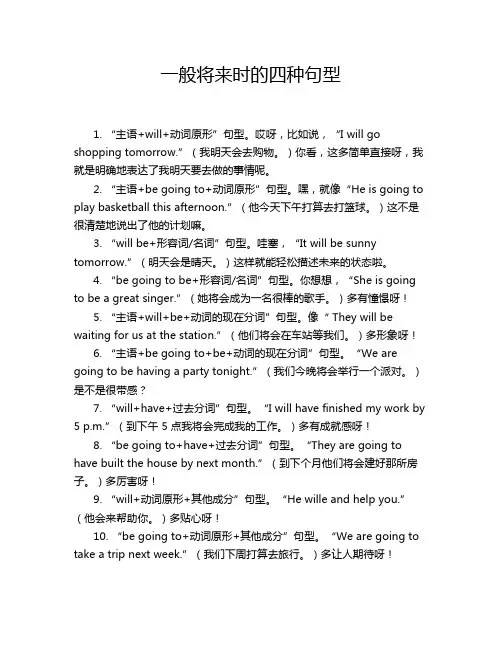
一般将来时的四种句型1. “主语+will+动词原形”句型。
哎呀,比如说,“I will go shopping tomorrow.”(我明天会去购物。
)你看,这多简单直接呀,我就是明确地表达了我明天要去做的事情呢。
2. “主语+be going to+动词原形”句型。
嘿,就像“He is going to play basketball this afternoon.”(他今天下午打算去打篮球。
)这不是很清楚地说出了他的计划嘛。
3. “will be+形容词/名词”句型。
哇塞,“It will b e sunny tomorrow.”(明天会是晴天。
)这样就能轻松描述未来的状态啦。
4. “be going to be+形容词/名词”句型。
你想想,“She is going to be a great singer.”(她将会成为一名很棒的歌手。
)多有憧憬呀!5. “主语+will+be+动词的现在分词”句型。
像“ They will be waiting for us at the station.”(他们将会在车站等我们。
)多形象呀!6. “主语+be going to+be+动词的现在分词”句型。
“We are going to be having a party tonight.”(我们今晚将会举行一个派对。
)是不是很带感?7. “will+have+过去分词”句型。
“I will have finished my work by 5 p.m.”(到下午 5 点我将会完成我的工作。
)多有成就感呀!8. “be going to+have+过去分词”句型。
“They are going to have built the house by next month.”(到下个月他们将会建好那所房子。
)多厉害呀!9. “will+动词原形+其他成分”句型。
“He wille and help you.”(他会来帮助你。
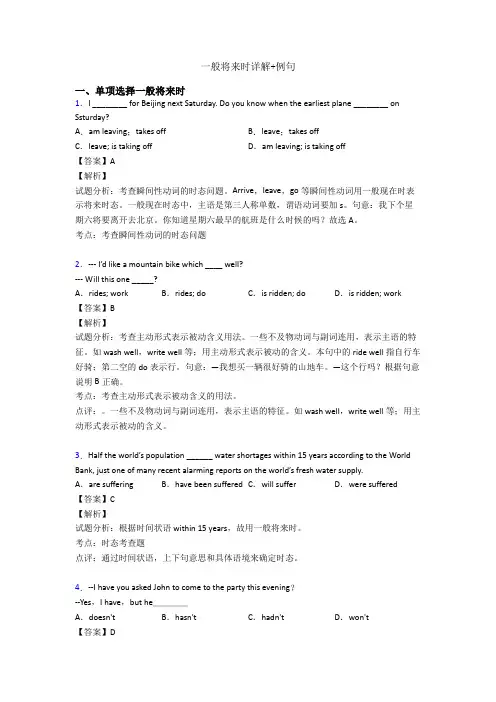
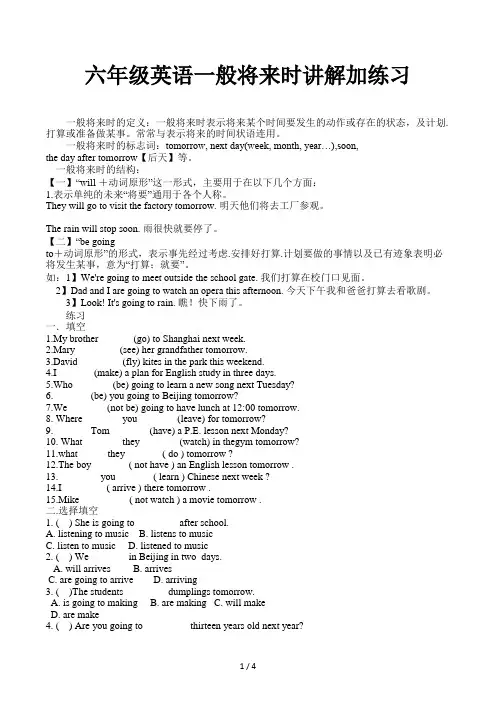
六年级英语一般将来时讲解加练习一般将来时的定义:一般将来时表示将来某个时间要发生的动作或存在的状态,及计划.打算或准备做某事。
常常与表示将来的时间状语连用。
一般将来时的标志词:tomorrow, next day(week, month, year…),soon,the day after tomorrow【后天】等。
一般将来时的结构:【一】“will +动词原形”这一形式,主要用于在以下几个方面:1.表示单纯的未来“将要”通用于各个人称。
They will go to visit the factory tomorrow. 明天他们将去工厂参观。
The rain will stop soon. 雨很快就要停了。
【二】“be goingto+动词原形”的形式,表示事先经过考虑.安排好打算.计划要做的事情以及已有迹象表明必将发生某事,意为“打算;就要”。
如:1】We're going to meet outside the school gate. 我们打算在校门口见面。
2】Dad and I are going to watch an opera this afternoon. 今天下午我和爸爸打算去看歌剧。
3】Look! It's going to rain. 瞧!快下雨了。
练习一.填空1.My brother ______ (go) to Shanghai next week.2.Mary ________ (see) her grandfather tomorrow.3.David ________ (fly) kites in the park this weekend.4.I_______ (make) a plan for English study in three days.5.Who _______ (be) going to learn a new song next Tuesday?6._______ (be) you going to Beijing tomorrow?7.We _______ (not be) going to have lunch at 12:00 tomorrow.8. Where _______ you _______ (leave) for tomorrow?9._______ Tom _______ (have) a P.E. lesson next Monday?10. What _______ they _______ (watch) in thegym tomorrow?11.what _____ they _______( do ) tomorrow ?12.The boy _______( not have ) an English lesson tomorrow .13.________ you _______( learn ) Chinese next week ?14.I ________ ( arrive ) there tomorrow .15.Mike _________ ( not watch ) a movie tomorrow .二.选择填空1. ( ) She is going to ________ after school.A. listening to musicB. listens to musicC. listen to musicD. listened to music2. ( ) We _______ in Beijing in two days.A. will arrivesB. arrivesC. are going to arriveD. arriving3. ( )The students ________ dumplings tomorrow.A. is going to makingB. are makingC. will makeD. are make4. ( ) Are you going to_________ thirteen years old next year?A. will beB. areC. beD. go5. ( ) ___will see a play in 5 days?A. WhenB. WhatC. WhoD. Whose6. ( ) Mary______ English next year.A. will learnB. will to learnC. are going to learn.D. learns7. ( ) He’ll _____ shopping this afternoon.A. goingB. goC. goesD. went8. ( ) Will you ____ at the bus stop at 10:30?A. meetingB. meetsC. meetD. met9. ( ) Lily and I _______ the guitar. next week.A. am going to playB. are going to playC. will playsD. play10. ( ) How ______ Jenny ___ home tomorrow?A. does......goB. is……goingC. will……goD. do……g o11. ( ) Who is going to _________ a song ?A. sings B singing C. to sing D. sing12. ( ) I _________in Beijing in three days.A. are going to arriveB. arriveC. will arriveD. arrives13. ( ) He _______some model planes tomorrow .A. going to makeB. is makingC. will make D makes14. ( ) Are you going to ___________a doctor next year ?A. will beB.. areC. beD. are going to15. ( ) She ________ you make supper this evening .A. helpsB. will helpC. is helpingD. is going help三.把下列句子变成一般疑问句,并给出肯定和否定回答。
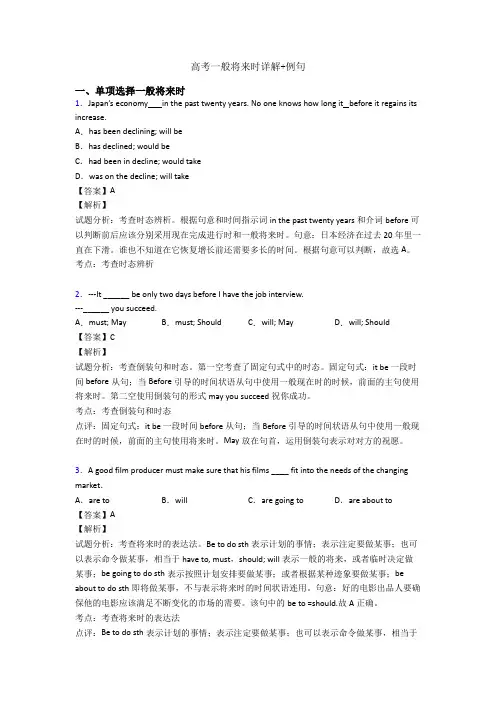
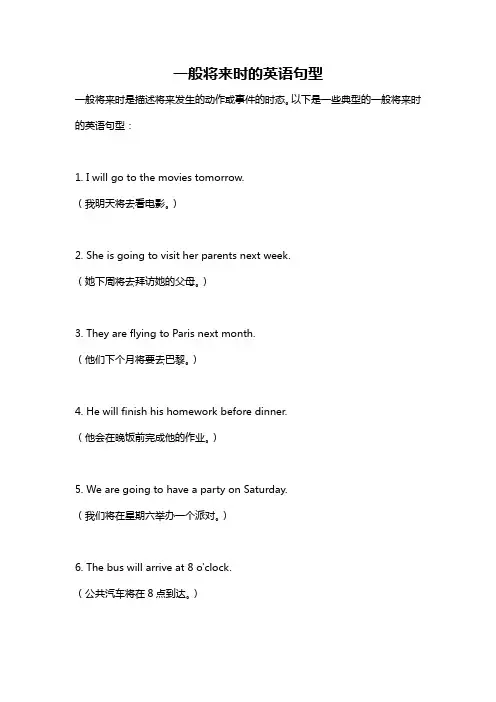
一般将来时的英语句型
一般将来时是描述将来发生的动作或事件的时态。
以下是一些典型的一般将来时的英语句型:
1. I will go to the movies tomorrow.
(我明天将去看电影。
)
2. She is going to visit her parents next week.
(她下周将去拜访她的父母。
)
3. They are flying to Paris next month.
(他们下个月将要去巴黎。
)
4. He will finish his homework before dinner.
(他会在晚饭前完成他的作业。
)
5. We are going to have a party on Saturday.
(我们将在星期六举办一个派对。
)
6. The bus will arrive at 8 o'clock.
(公共汽车将在8点到达。
)
7. She is going to start her new job next week. (下周她将开始她的新工作。
)
8. They will meet at the park tomorrow evening. (他们明晚将在公园见面。
)
9. We are going to travel to Europe next year. (明年我们将前往欧洲旅行。
)
10. He will call you later tonight.
(他今晚晚些时候会打电话给你。
)。
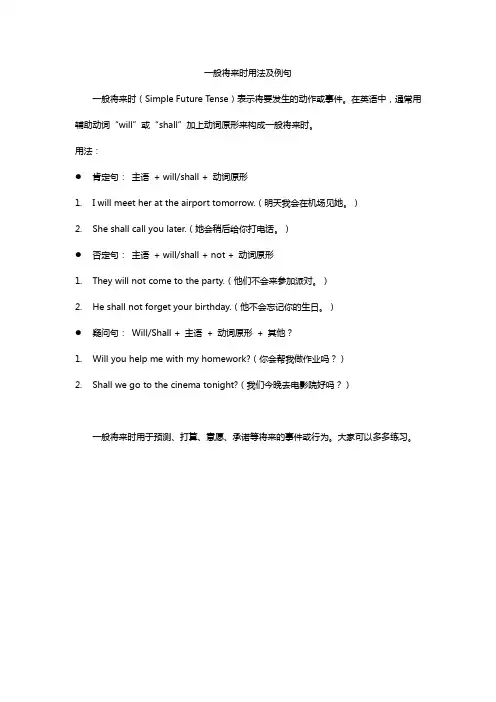
一般将来时用法及例句
一般将来时(Simple Future Tense)表示将要发生的动作或事件。
在英语中,通常用辅助动词“will”或“shall”加上动词原形来构成一般将来时。
用法:
●肯定句:主语+ will/shall + 动词原形
1.I will meet her at the airport tomorrow.(明天我会在机场见她。
)
2.She shall call you later.(她会稍后给你打电话。
)
●否定句:主语+ will/shall + not + 动词原形
1.They will not come to the party.(他们不会来参加派对。
)
2.He shall not forget your birthday.(他不会忘记你的生日。
)
●疑问句:Will/Shall + 主语+ 动词原形+ 其他?
1.Will you help me with my homework?(你会帮我做作业吗?)
2.Shall we go to the cinema tonight?(我们今晚去电影院好吗?)
一般将来时用于预测、打算、意愿、承诺等将来的事件或行为。
大家可以多多练习。
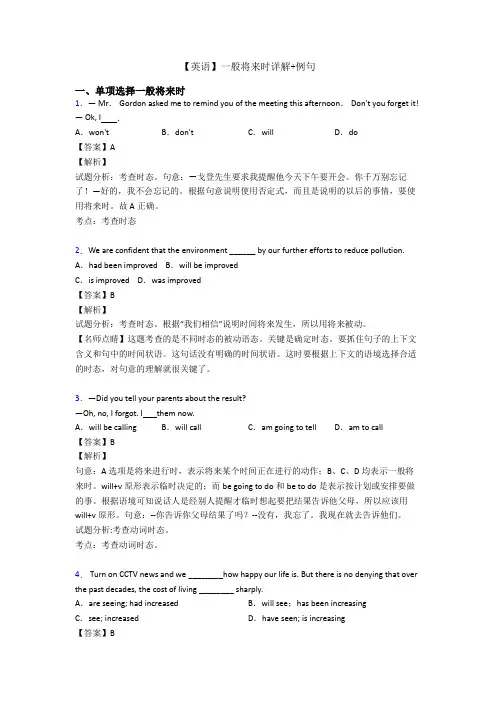
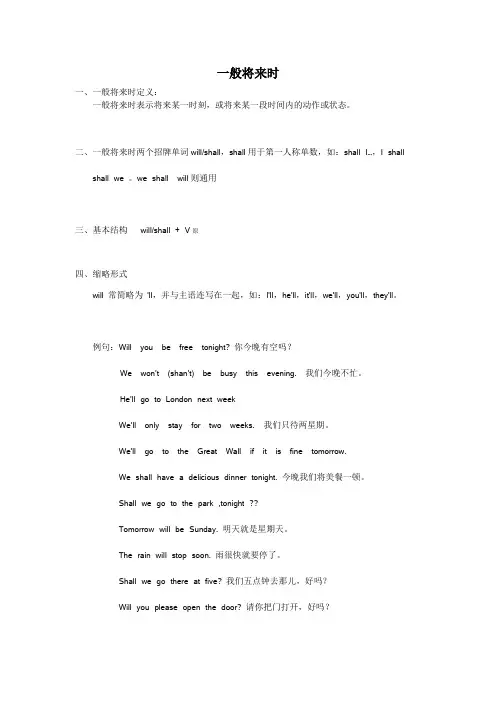
一般将来时一、一般将来时定义:一般将来时表示将来某一时刻,或将来某一段时间内的动作或状态。
二、一般将来时两个招牌单词will/shall,shall用于第一人称单数,如:shall I…,I shallshall we 。
we shall will则通用三、基本结构will/shall + V原四、缩略形式will 常简略为'll,并与主语连写在一起,如:I'll,he'll,it'll,we'll,you'll,they'll。
例句:Will you be free tonight? 你今晚有空吗?We won’t(shan’t) be busy this evening. 我们今晚不忙。
He’ll go to London next weekWe’ll only stay for two weeks. 我们只待两星期。
We’ll go to the Great Wall if it is fine tomorrow.We shall have a delicious dinner tonight. 今晚我们将美餐一顿。
Shall we go to the park ,tonight ??Tomorrow will be Sunday. 明天就是星期天。
The rain will stop soon. 雨很快就要停了。
Shall we go there at five? 我们五点钟去那儿,好吗?Will you please open the door? 请你把门打开,好吗?五、用法基本用法:“助动词will或shall+动词原形”这一形式,表示将来发生的事情,用于征求对方的意见或表示客气的邀请。
在口语中will用于所有人称,书面语中第一人称常用shall。
如:I can see you're busy, so I won't stay long.我看得出你很忙,所以我不会呆太久。
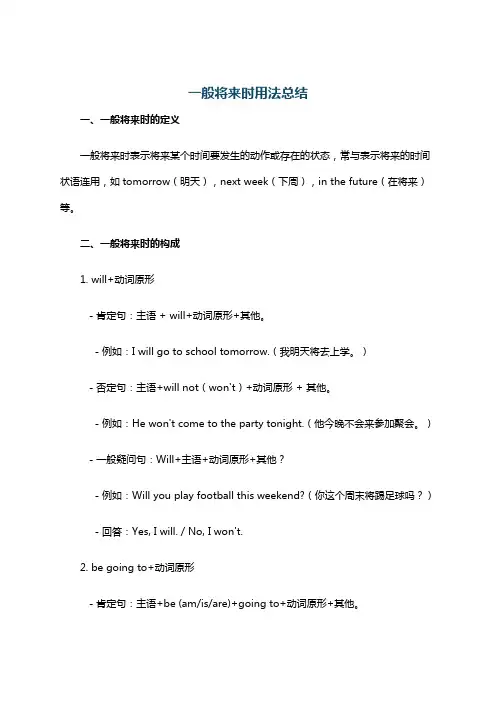
一般将来时用法总结一、一般将来时的定义一般将来时表示将来某个时间要发生的动作或存在的状态,常与表示将来的时间状语连用,如tomorrow(明天),next week(下周),in the future(在将来)等。
二、一般将来时的构成1. will+动词原形- 肯定句:主语 + will+动词原形+其他。
- 例如:I will go to school tomorrow.(我明天将去上学。
)- 否定句:主语+will not(won't)+动词原形 + 其他。
- 例如:He won't come to the party tonight.(他今晚不会来参加聚会。
) - 一般疑问句:Will+主语+动词原形+其他?- 例如:Will you play football this weekend?(你这个周末将踢足球吗?) - 回答:Yes, I will. / No, I won't.2. be going to+动词原形- 肯定句:主语+be (am/is/are)+going to+动词原形+其他。
- 例如:She is going to visit her grandparents next month.(她打算下个月去看望她的祖父母。
)- 否定句:主语+be (am/is/are)+not+going to+动词原形+其他。
- 例如:They are not going to have a meeting this afternoon.(他们今天下午不打算开会。
)- 一般疑问句:Be (am/is/are)+主语+going to+动词原形+其他?- 例如:Are you going to do your homework tonight?(你今晚打算做你的家庭作业吗?)- 回答:Yes, I am. / No, I'm not.三、一般将来时的用法1. 表示将来的计划或打算(be going to侧重于计划打算;will侧重于意愿)- I'm going to study hard this term.(我打算这个学期努力学习。
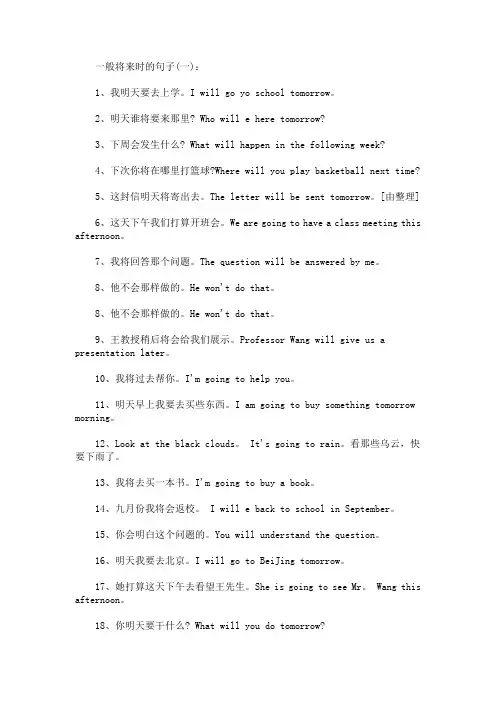
一般将来时的句子(一):1、我明天要去上学。
I will go yo school tomorrow。
2、明天谁将要来那里? Who will e here tomorrow?3、下周会发生什么? What will happen in the following week?4、下次你将在哪里打篮球?Where will you play basketball next time?5、这封信明天将寄出去。
The letter will be sent tomorrow。
[由整理]6、这天下午我们打算开班会。
We are going to have a class meeting this afternoon。
7、我将回答那个问题。
The question will be answered by me。
8、他不会那样做的。
He won't do that。
8、他不会那样做的。
He won't do that。
9、王教授稍后将会给我们展示。
Professor Wang will give us a presentation later。
10、我将过去帮你。
I'm going to help you。
11、明天早上我要去买些东西。
I am going to buy something tomorrow morning。
12、Look at the black clouds。
It's going to rain。
看那些乌云,快要下雨了。
13、我将去买一本书。
I'm going to buy a book。
14、九月份我将会返校。
I will e back to school in September。
15、你会明白这个问题的。
You will understand the question。
16、明天我要去北京。
I will go to BeiJing tomorrow。
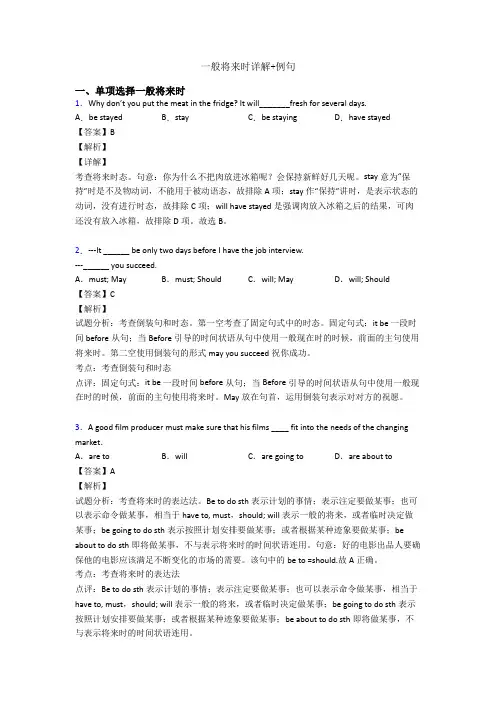
一般将来时的句型结构和例句1. 一般将来时的概念嘿,大家好!今天我们来聊聊一般将来时。
说到将来时,想必大家都有过这样的体验:想给朋友约个时间,或者规划个旅行,但又不知道该怎么表达对未来的期望和计划。
其实,一般将来时就像那颗星星,指引着我们走向未知的未来。
简单来说,它主要用来表示将来发生的事情。
这种时态很容易搞定,通常使用“will”或者“be going to”来构成,简单明了,不费吹灰之力。
2. 一般将来时的基本结构2.1 “will”结构首先,我们来看看用“will”构成的一般将来时。
它的句型结构就是:主语 + will + 动词原形。
比如,如果你想告诉朋友“我明天会去图书馆”,你可以说“I will go to thelibrary tomorrow。
”听起来是不是很顺畅呢?再比如,“她会参加派对”就可以说成“She will attend the party.”是不是感觉自己就像个未来学家?2.2 “be going to”结构接下来,我们聊聊“be going to”结构。
这个结构的形式是:主语 + be (am/is/are) + going to + 动词原形。
比如,“我打算去旅行”可以说“I am going to travel.” 这里的“going to”就像个小火箭,把我们的计划送向未来。
再来个例子:“他们准备去看电影”就可以说“They are going to watch a movie.” 听起来是不是很有干劲?3. 一般将来时的应用场景3.1 表达意图和计划那么,一般将来时到底在哪些场合能派上用场呢?哦,真是无处不在!比如,当你和朋友一起讨论周末的计划时,“我们将去海滩吗?”可以问“We will go to the beach, right?”或者,当你在职场上,需要告诉同事下周的会议时间时,“我们下周三会开会”可以说“We will have a meeting next Wednesday.” 这些都是日常生活中常见的场景,毫不费力地用上将来时,简直就是小菜一碟!3.2 预测未来此外,一般将来时也常用于预测未来。
将来时的各种形式及例句整理将来时是英语中用来表示将来动作或状态的一种时态,包含了多种形式。
在本文中,将介绍将来时的各种形式并提供相应的例句。
一、一般将来时一般将来时表示将来某个时间会发生的动作或状态。
一般将来时的构成方式如下:1. 主语 + will + 动词原形2. 主语 + be going to + 动词原形以下是一些例句:1. I will go to the movies tomorrow.(我明天会去看电影。
)2. They are going to have a party next week.(他们下周要开派对。
)3. She will learn to play the piano.(她将学会弹钢琴。
)二、将来进行时将来进行时表示将来某一时刻正在进行的动作。
将来进行时的构成方式如下:1. 主语 + will be + 动词ing以下是一些例句:1. They will be watching a movie at this time tomorrow.(明天此时他们将在看电影。
)2. She will be working on her project tomorrow morning.(明天早上她将在进行项目工作。
)三、将来完成时将来完成时表示将来某一时刻之前已经完成的动作。
将来完成时的构成方式如下:1. 主语 + will have + 过去分词以下是一些例句:1. By the time he arrives, I will have finished my homework.(等他到达时,我将已经完成作业。
)2. They will have left for Paris by the end of this month.(到本月末,他们将已经去巴黎了。
)四、将来完成进行时将来完成进行时表示将来某一时刻之前已经开始并且一直在进行的动作。
将来完成进行时的构成方式如下:1. 主语 + will have been + 动词ing以下是一些例句:1. By the time they arrive, we will have been waiting for three hours.(等他们到达时,我们将已经等待了三个小时。
一般将来时例句(精选)“表示将来其中一时刻的动作或状态,或将来其中一段时间内经常的动作或状态。
接下来就由带来一般将来时例句,希望对你有所帮助!1、There will be a bad news for you。
将有一个坏消息给你。
2、There will be a delicious supper for us。
我们将有一顿美味的晚餐。
3、There will be a new dress for her。
她将有一条新裙子。
4、There will be a good news for you。
将有一个好消息给你。
5、There will be a show on the playground the day after tomorrow。
后天操场上将有一场表演。
6、There will be a concert tomorrow。
明天将有一场演唱会。
7、There will be a gift for me。
我将有一份礼物。
8、There will be a English class this afternoon。
今日午时有一节英语课。
9、There is going to have a English test next Monday。
下周一将有一次英语测验。
10、There will be a mobile phone tomorrow for me。
明天我将有一部手机。
11、There will be a fortable room for you tomorrow。
明天你将有一个舒适的房间。
12、There will be rain this evening。
今晚要下雨。
13、There will be television in our classroom。
我们教室将有一台电视机。
14、There will be a happy journey for her。
她将有一个愉快的旅程。
一般将来时的定义结构例句用法10一般将来时的定义结构例句用法10
结构:主语 + will + 动词原形
例句:
1. I will go to the store tomorrow.
(我明天会去商店。
)
2. He will call you later.
3. We will have a meeting next week.
(下周我们将开会。
)
4. She will study for the exam tonight.
(她今晚会复习考试。
)
5. They will visit their grandparents next month.
(他们下个月会去拜访他们的祖父母。
)
用法:
1.表达将来的计划或意图:
I will buy a new car next year.(我明年会买一辆新车。
)
2.表达预测或推测的动作或状态:
The weather will be sunny tomorrow.(明天天气会晴朗。
3.表示请求或许诺:
Will you help me with my homework?(你会帮助我做作业吗?)
4.用于条件句中,表示假设的动作或状态:
If it rains tomorrow, we will stay at home.(如果明天下雨,我们会呆在家里。
)
5.用于建议或邀请:。